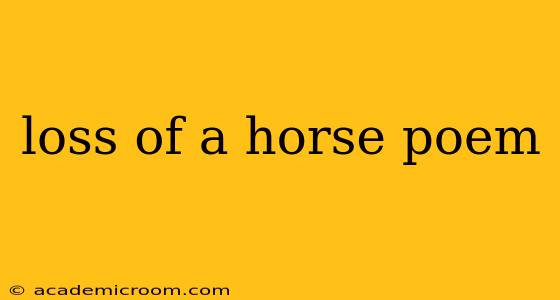The Empty Stall: A Poem on the Loss of a Horse
The silence hangs, a heavy shroud, where once a spirit shone, A vacant stall, a shadowed space, where happy hooves had flown. The scent of hay, a ghostly trace, a memory bittersweet, Of gentle eyes and noble grace, and rhythmic, pounding feet.
His coat, the sun-kissed chestnut gleam, now rests beneath the sod, A whispered name, a fading dream, a journey to the God Of fields of green and endless sky, where weary souls find rest, Beyond the tear that dims my eye, and sorrow in my breast.
His strength, a mountain's steadfast might, his spirit, wild and free, He danced with dawn and kissed the night, a loyal friend to me. Through sun-drenched days and stormy rain, his heart remained so true, A bond unbreakable, a chain of love, forever new.
How do I cope with the loss of my horse?
Grief is a deeply personal journey, and there's no single "right" way to cope with the loss of a beloved horse. Allow yourself to feel the pain; don't suppress your emotions. Acknowledge the profound bond you shared and the significant impact your horse had on your life. Consider talking to a friend, family member, or grief counselor who understands the unique bond between humans and animals. Journaling your memories and feelings can be incredibly therapeutic. Remembering the happy times and celebrating your horse's life is a crucial part of healing. Some find comfort in creating a memorial, planting a tree, or donating to an equine charity in your horse's name.
What are the stages of grief after losing a horse?
The stages of grief are not always linear and can vary greatly from person to person. You might experience denial, anger, bargaining, depression, and acceptance, but these may not occur in this specific order or even all at once. It's important to remember that grief is a process, not a destination, and there's no timeline for healing. Allow yourself the time and space you need to mourn your loss. Seek support from others who understand the depth of your connection with your horse.
Is it normal to feel guilty after losing a horse?
Yes, feelings of guilt are entirely normal after losing a horse. You might question decisions you made regarding your horse's care, even if those decisions were made with the best intentions. It's important to remember that you loved and cared for your horse to the best of your ability. Ruminating on "what ifs" can hinder healing, so try to focus on the positive memories and the love you shared. Talking to a therapist or grief counselor can help you process these feelings of guilt and move forward.
How long does it take to get over losing a horse?
There is no set timeframe for grieving the loss of a horse. The depth of your relationship and your personal coping mechanisms will significantly influence the healing process. Some people find solace relatively quickly, while others may experience prolonged grief. Be patient with yourself and allow yourself the time you need to process your emotions. Don't compare your grief to others; everyone grieves differently. Remember that it's okay to seek professional help if you're struggling to cope.
How can I memorialize my horse?
Memorializing your horse can be a powerful way to honor its memory and help you with the grieving process. Consider creating a photo album or scrapbook filled with cherished memories. You could plant a tree in its honor, create a personalized memorial stone or plaque, or donate to an equine charity in its name. Some people write poems or create artwork inspired by their horse. The possibilities are endless, so choose a method that feels meaningful and personal to you. The goal is to celebrate your horse’s life and keep its memory alive.
This poem and the subsequent Q&A aim to provide comfort and support during a difficult time. Remember, you are not alone in your grief. Seeking help from friends, family, or professionals is a sign of strength, not weakness.
